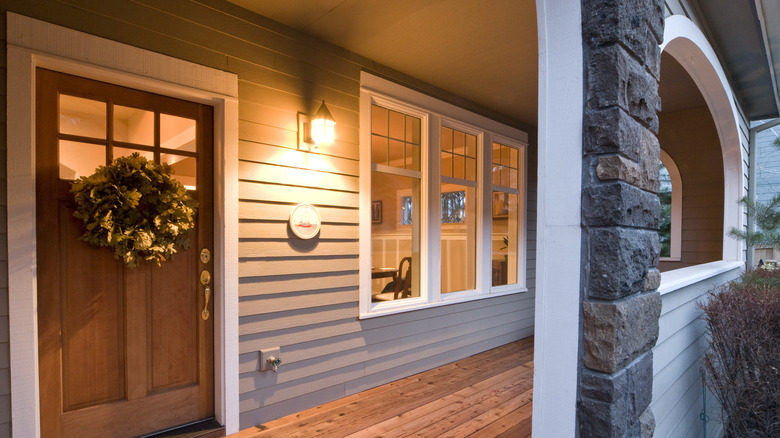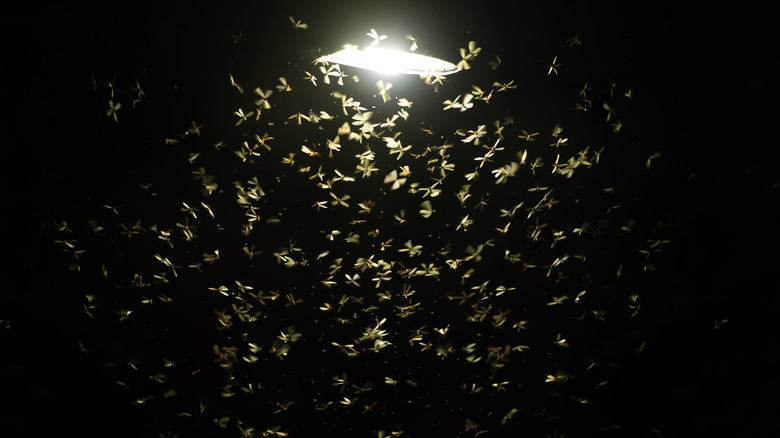Outdoor Lighting Rules That'll Help Reduce Spiders Around The House
Even if you aren't one of the estimated 3 to 15% of people with arachnophobia, a spider invasion is hardly a pleasant experience for anyone. Only a few species of house spiders, like the brown recluse and black widow, have a bite that is dangerous to humans, but even non-venomous spiders can be a nuisance when they're congregating on your porch or patio. Spiders aren't necessarily drawn to light and bright porches — but their food source is! If your home is teeming with moths, mosquitoes, and other flying critters, it becomes like an all-you-can-eat buffet for spiders, who will happily set up camp on the porch and eventually wander inside. The best solution to a swarm of spiders is to switch to a yellow-tinted bug light and turn off your outdoor lights as much as possible.
However, a porch light is an important thing to have, especially if you tend to return home after dark or worry about your neighborhood's safety. Here's how using a yellow bug light can keep spiders at bay, some ways to reduce your light usage, and other tips for keeping creepy critters out of your sanctuary.
Shed the right light
The easiest solution to your spider invasion is to swap your regular porch bulbs for yellow-tinted bug lights. Yellow bug lights don't kill or repel bugs, but they are much less attractive to them than a bright, traditional light. Many moths and other flying insects won't even be able to see or notice your yellow lights, and will be much more interested in the natural moonlight or the street lamps yards away from your home. Spiders will follow their food source, so reducing the number of moths fluttering around your home is a surefire way to reduce the number of spiders.
Another way to keep spiders away from your home is to turn off your porch lights as much as possible. If remembering to douse the lights before bed sounds like a chore, consider installing a motion sensor or automatic timer. Spiders are mostly nocturnal creatures, meaning they prefer to do most of their hunting and exploring at night, in addition to around dusk and dawn. By reducing your light use during these times, you may be able to make your home less attractive to a variety of creepy crawlies, including spiders.
Make your home a spider-free zone
When the sun starts to rise, many spiders will scurry back into the darkness, whether that be under the doormat, behind a bench, or worse, inside your home. To keep spiders from getting too comfortable around your house, it's important to pick up clutter as much as possible and remove hiding places from outdoor areas. Spiders also prefer cool and damp spaces, so reduce the amount of standing water you keep around your home and ensure your front and back patios have good drainage away from the house. If the spider problem has spread to your garage or basement, you may need to run a dehumidifier to dry up the room and make it less appealing to them.
Finally, if all else fails, you can use an arachnicide or diatomaceous earth to kill current invaders and deter more from entering your home. Sprinkle diatomaceous earth or spray your arachnicide around baseboards, windows, and doorways, where spiders tend to hang around the most. If you're dealing with a serious infestation, especially one with venomous brown recluses or black widows, it's never a bad idea to call in the professionals. An exterminator will be able to evaluate the problem, learn what's attracting them, and remove as many spiders as possible. They'll also look for entry points around your home, and block them up to keep more eight-legged roommates from moving in uninvited.


